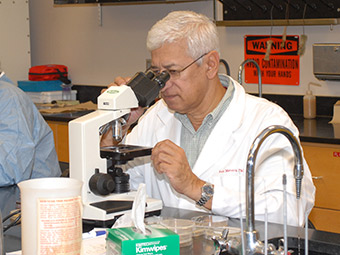Document Type
Article
Publication Date
5-2021
Abstract
Tropical forests are an important part of global water and energy cycles, but the mechanisms that drive seasonality of their land-atmosphere exchanges have proven challenging to capture in models. Here, we (1) report the seasonality of fluxes of latent heat (LE), sensible heat (H), and outgoing short and longwave radiation at four diverse tropical forest sites across Amazonia—along the equator from the Caxiuanã and Tapajós National Forests in the eastern Amazon to a forest near Manaus, and from the equatorial zone to the southern forest in Reserva Jaru; (2) investigate how vegetation and climate influence these fluxes; and (3) evaluate land surface model performance by comparing simulations to observations. We found that previously identified failure of models to capture observed dry-season increases in evapotranspiration (ET) was associated with model overestimations of (1) magnitude and seasonality of Bowen ratios (relative to aseasonal observations in which sensible was only 20%–30% of the latent heat flux) indicating model exaggerated water limitation, (2) canopy emissivity and reflectance (albedo was only 10%–15% of incoming solar radiation, compared to 0.15%–0.22% simulated), and (3) vegetation temperatures (due to underestimation of dry-season ET and associated cooling). These partially compensating model-observation discrepancies (e.g., higher temperatures expected from excess Bowen ratios were partially ameliorated by brighter leaves and more interception/evaporation) significantly biased seasonal model estimates of net radiation (Rn), the key driver of water and energy fluxes (LE ~ 0.6 Rn and H ~ 0.15 Rn), though these biases varied among sites and models. A better representation of energy-related parameters associated with dynamic phenology (e.g., leaf optical properties, canopy interception, and skin temperature) could improve simulations and benchmarking of current vegetation–atmosphere exchange and reduce uncertainty of regional and global biogeochemical models.
Recommended Citation
Restrepo‐Coupe, Natalia, Loren P. Albert, Marcos Longo, Ian Baker, Naomi M. Levine, Lina M. Mercado, Alessandro C. da Araujo et al. "Understanding water and energy fluxes in the Amazonia: Lessons from an observation‐model intercomparison." Global Change Biology 27, no. 9 (2021): 1802-1819. https://doi.org/10.1111/gcb.15555
Publication Title
Global Change Biology
DOI
https://doi.org/10.1111/gcb.15555



Comments
See the Terms and Conditions (https://onlinelibrary.wiley.com/terms-and-conditions) on Wiley Online Library for rules of use; OA articles are governed by the applicable Creative Commons License. Original published version available at https://doi.org/10.1111/gcb.15555